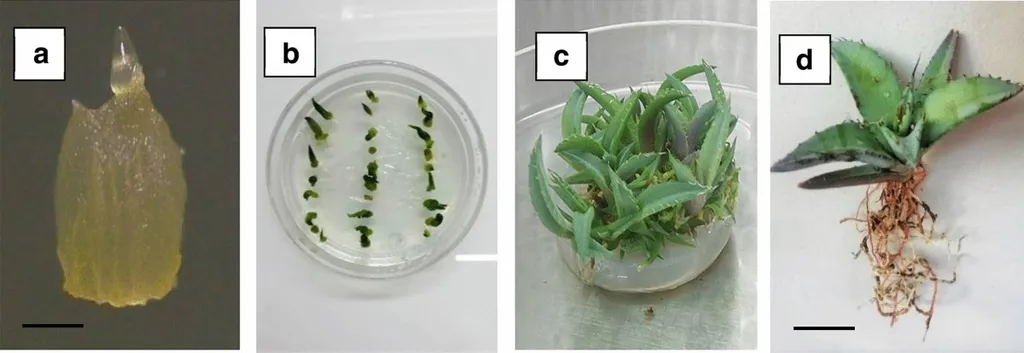In the heart of Mexico’s rich agricultural heritage, a groundbreaking review published in the journal ‘Plants’ is set to revolutionize the way we cultivate *Agave* species. Led by Estefany Alejandra Sánchez-Mendoza from the Universidad de Guanajuato, this research delves into the intricate world of plant growth regulators (PGRs) and their pivotal role in the in vitro culture of *Agave*, offering promising avenues for the agriculture sector.
*Agave* species, with their cultural, ecological, and economic significance, have long been a staple in Mexican agriculture, used for food, fiber, and beverages. However, traditional propagation methods have posed challenges, including long life cycles, low seed germination rates, and susceptibility to diseases. The solution? In vitro culture, a biotechnological strategy that has emerged as a game-changer for clonal propagation, germplasm conservation, and physiological enhancement.
Sánchez-Mendoza’s review synthesizes recent studies on *Agave* in vitro culture protocols, focusing on the use of PGRs. “Classical PGRs such as 6-benzylaminopurine (BAP), benzyladenine (BA), 2,4-dichlorophenoxyacetic acid (2,4-D), indole-3-acetic acid (IAA), and indole-3-butyric acid (IBA) are widely utilized,” explains Sánchez-Mendoza. These regulators play crucial roles in organogenesis, somatic embryogenesis, shoot proliferation, and rooting. The review highlights that combinations of BA + 2,4-D and BA + IAA have shown high efficiency in embryogenic callus induction and shoot multiplication.
But the innovation doesn’t stop there. Non-traditional regulators like abscisic acid (ABA) and putrescine (Put) have also been shown to affect embryo maturation, opening up new possibilities for enhancing the propagation process.
The commercial implications of this research are vast. By optimizing in vitro culture protocols, farmers and agribusinesses can look forward to improved crop yields, disease-resistant plants, and more efficient use of agricultural resources. This could be particularly beneficial for the burgeoning bioenergy, nutraceuticals, and sustainable agriculture industries, where *Agave* species play a significant role.
Moreover, the review identifies key research gaps and highlights the need for species-specific optimization and molecular validation. This underscores the importance of continued investment in agricultural research and development, ensuring that the sector remains at the forefront of technological innovation.
As we look to the future, this research paves the way for more efficient and sustainable agricultural practices. By harnessing the power of PGRs in in vitro culture, we can unlock the full potential of *Agave* species, benefiting not only the agriculture sector but also the environment and society as a whole. With the insights provided by Sánchez-Mendoza and her team, the stage is set for a new era of agricultural innovation, driven by science and technology.
Published in ‘Plants’ and led by Estefany Alejandra Sánchez-Mendoza from the División de Ciencias de la Vida, Campus Irapuato-Salamanca, Universidad de Guanajuato, this research is a testament to the power of scientific inquiry in shaping the future of agriculture.

